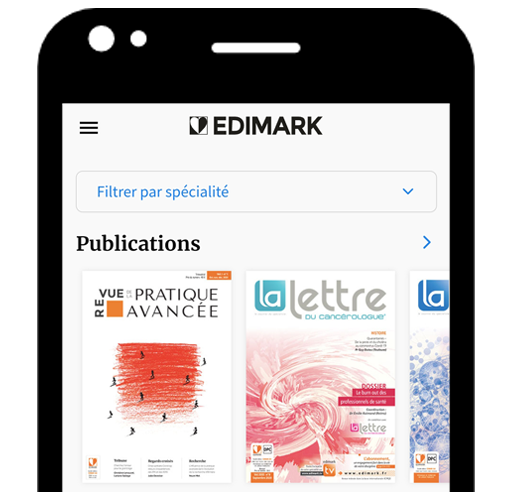Les progrès importants réalisés au cours de ces dernières années dans la compréhension des mécanismes moléculaires impliqués dans le développement des cancers, et en particulier des cancers bronchiques non à petites cellules (CBNPC), ont permis d’identifier des altérations moléculaires génomiques dites “drivers oncogéniques” et de développer des thérapies ciblant spécifiquement ces anomalies. À ce jour, jusqu’à 50 % des adénocarcinomes bronchiques présentent une altération moléculaire ciblable : mutations activatrices de l’EGFR, mutations de l’exon 14 de MET, mutations de BRAF, mutations de HER2, mutations G12C de KRAS, fusions de ALK, RET, ROS1 ou encore NTRK (figure 1) [1].
Différents tests moléculaires diagnostiques ont été développés pour la recherche et l’identification de ces altérations moléculaires. Il peut s’agir de techniques ciblées, permettant de diagnostiquer un nombre très restreint d’altérations, ou de séquençage de nouvelle génération (NGS) sur ADN ou ARN (RNAseq) permettant la détection d’un grand nombre d’altérations [2]. Les techniques de RNAseq sont plus précises pour la détection des fusions. Alors que ces tests moléculaires sont classiquement effectués sur le tissu tumoral, le recours à leur usage sur des fluides corporels (sang, liquide cérébrospinal, liquide pleural) ou biopsies liquides est de plus en plus courant [2].
L’ensemble des thérapies ciblant ces différentes altérations moléculaires développées ou en cours de développement doit ensuite franchir différentes étapes : autorisation de mise sur le marché (AMM) européenne délivrée par l’EMA, AMM française validée par l’ANSM et remboursement octroyé par la Haute Autorité de santé (HAS) [2]. Dans certaines situations, ces traitements innovants peuvent bénéficier d’un dispositif d’accès précoce [2].■
FIGURES
Références
1. Skoulidis F et al. Co-occurring genomic alterations in non- small-cell lung cancer biology and therapy. Nat Rev Cancer 2019;19(9):495-509.
2. INCa. Patients atteints d’un cancer bronchique non à petites cellules. Indication des tests moléculaires en vue de la prescription de traitements de précision. 2023. https://www.e-cancer.fr/Expertises-et-publications/Catalogue-des-publications/Patients-atteints-d-un-cancer-bronchique-non-a-petites-cellules-indications-des-tests-moleculaires-en-vue-de-la-prescription-de-traitements-de-precision
3. Zhou C et al. Treatment outcomes and safety of mobocertinib in platinum-pretreated patients with EGFR Exon 20 insertion-positive metastatic non-small cell lung cancer: a phase 1/2 open-label nonrandomized clinical trial. JAMA Oncol 2021;7:e214761.
4. Park K et al. Amivantamab in EGFR Exon 20 insertion-mutated non-small-cell lung cancer progressing on platinum chemotherapy: initial results from the CHRYSALIS phase I study. J Clin Oncol 2021;39:3391-402.
5. Couraud S et al. Cancer bronchique non à petites cellules. Référentiels Auvergne Rhône-Alpes en oncologie thoracique 2023. https://ressources-aura.fr/wp-content/uploads/2023/04/01_CBNPC_2023_Texte-integral.pdf
6. de Langen AJ et al. Sotorasib versus docetaxel for previously treated non-small-cell lung cancer with KRASG12C mutation: a randomised, open-label, phase 3 trial. Lancet 2023;401:733-46.
7. Jänne PA et al. Adagrasib in non-small-cell lung cancer harboring a KRASG12C Mutation. N Engl J Med 2022;387:120‑31.
8. Planchard D et al. Phase 2 study of dabrafenib plus trametinib in patients with BRAF V600E-mutant metastatic NSCLC: updated 5-year survival rates and genomic analysis. J Thorac Oncol 2022;17(1):103-15.
9. Li BT et al. Trastuzumab deruxtecan in HER2-mutant non-small-cell lung cancer. N Engl J Med 2022;386(3):241-51.
10. Wolf J et al. Capmatinib in MET Exon 14–Mutated or MET-amplified non-small-cell lung cancer. N Engl J Med 2020;383:944-57.
11. Le X et al. Tepotinib efficacy and safety in patients with MET Exon 14 Skipping NSCLC: outcomes in patient subgroups from the VISION study with relevance for clinical practice. Clin Cancer Res 2022 ;28 :1117-26.
12. Mazières J et al. Crizotinib therapy for advanced lung adenocarcinoma and a ROS1 rearrangement: results from the EUROS1 Cohort. J Thorac Oncol 2015;33(9):992-9.
13. Shaw AT et al. Crizotinib in ROS1-rearranged advanced non-small-cell lung cancer (NSCLC): updated results, including overall survival, from PROFILE 1001. Ann Oncol 2019;30:1121-6.
14. Moro-Sibilot D et al. Crizotinib in c-MET- or ROS1 positive NSCLC: results of the AcSe´ phase II trial. Ann Oncol 2019;30:1985‑91.
15. Drilon A et al. Long-term efficacy and safety of entrectinib in ROS1 Fusion–Positive NSCLC. JTO Clin Res Rep 2022;3:100332.
16. Peters S et al. Efficacy/safety of entrectinib in patients (pts) with ROS1-positive (ROS1+) advanced/ metastatic NSCLC from the blood first assay screening trial (BFAST). ASCO 2022; abst LBA9023.
17. Yun MR et al. Repotrectinib exhibits potent antitumor activity in treatment-naïve and solvent-front-mutant ROS1-rearranged non-small cell lung cancer. Clin Cancer Res 2020;26(13):3287-95.
18. Griesinger F et al. Safety and efficacy of pralsetinib in RET fusion positive non-small-cell lung cancer including as first-line therapy: update from the ARROW trial. Ann Oncol 2022;33(11):1168-78.
19. Drilon A et al. Durability of efficacy and safety with selpercatinib in patients with RET Fusion+ non-small-cell lung cancer: LIBRETTO-001. ELCC 2023;abst 27P.
20. Drilon A et al. Efficacy and safety of larotrectinib in patients with tropomyosin receptor kinase fusion-positive lung cancers. JCO Precis Oncol 2022;6:e2100418.
21. Cho BC et al. Updated efficacy and safety of entrectinib in patients (pts) with NTRK fusion-positive (NTRK-fp) NSCLC. ESMO 2022;110P 2022;33:S82-3.
Liens d'intérêt
N. Charbonnier déclare ne pas avoir de liens d’intérêts.
M. Duruisseaux déclare avoir des liens d’intérêts avec AbbVie, Amgen, AstraZeneca, Blueprint, BMS, Boehringer Ingelheim, GamaMabs Pharma, GSK, Guardant, Lilly, Merus Labs, MSD, NanoString, Pfizer, Roche, Sanofi et Takeda.
J. Remon Masip déclare avoir des liens d’intérêts avec BMS, Merck, MSD, Roche et Takeda.



